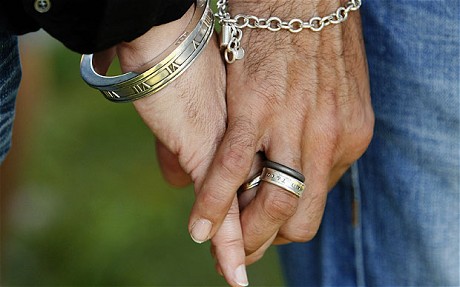Differences between civil union and gay marriage
What is marriage?
Marriage is a unique legal status conferred by and recognized by governments the world over. It brings with it a host of reciprocal obligations, rights, and protections. Yet it is more than the sum of its legal parts. It is also a cultural institution. The word itself is a fundamental protection, conveying clearly that you and your life partner love each other, are united and belong by each other’s side. It represents the ultimate expression of love and commitment between two people and everyone understands that. No other word has that power, and no other word can provide that protection.

What is a civil union?
A civil union is a legal status created by the state of Vermont in 2000 and subsequently by the states of Connecticut, New Hampshire, New Jersey, Rhode Island, Illinois, Delaware and Hawaii. It provides legal protection to couples at the state law level, but omits federal protections as well as the dignity, clarity, security and power of the word “marriage.”
What are some of the limitations of civil unions?
Civil unions are different from marriage, and that difference has wide-ranging implications that make the two institutions unequal. Here is a quick look at some of the most significant differences:Portability:
Marriages are respected state to state for all purposes, but questions remain about how civil unions will be treated in other states since very few states have civil unions.
Ending a Civil Union:
If you are married, you can get divorced in any state in which you are a resident, provided that state recognizes the marriages of same-sex couples. But if states continue to disrespect civil unions, there is no way to end the relationship other than by establishing residency in a state that respects the civil union.
Federal Benefits:
According to a 1997 GAO report, civil marriage brings with it at least 1,138 legal protections and responsibilities from the federal government, including the right to take leave from work to care for a family member, the right to sponsor a spouse for immigration purposes, and Social Security survivorbenefits that can make a difference between old age in poverty and old age in security. Civil unions bringfew (if any) of these critical legal protections.
Taxes & Public Benefits for the Family:
Because the federal government does not respect civil unions, a couple with a civil union will be in a kind of limbo with regard to governmental functions performed by both state and federal governments, such as taxation, pension protections, provision of insurance for families, and means-tested programs like Medicaid. Even when states try to provide legal protections, they may be foreclosed from doing so in joint federal/state programs.
Filling out forms:
Every day, we fill out forms that ask us whether we are married or single. People joined in a civil union don’t fit into either category. People with civil unions should be able to identify themselves as a single family unit, but misrepresenting oneself on official documents can be considered fraud and carriespotential serious criminal penalties.
Separate & Unequal -- Second-Class Status:
Even if there were no substantive differences in the way the law treated marriages and civil unions, the fact that a civil union remains a separate status just for gay people represents real and powerful inequality. We’ve been down this road before in this country and should not kid ourselves that a separate institution just for gay people is a just solution here either. Our constitution requires legal equality for all.Including gay and lesbian couples within existing marriage laws is the fairest and simplest thing to do.
Register to date PortuGAYS gay members!









